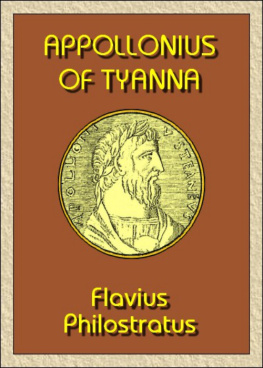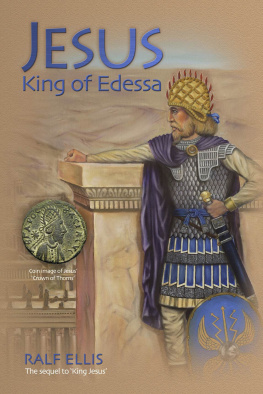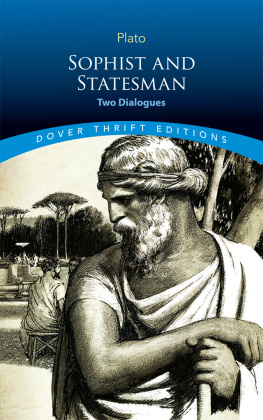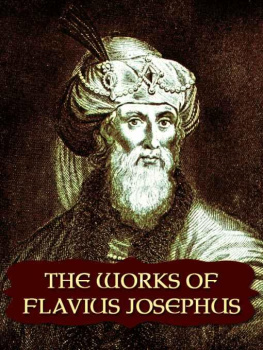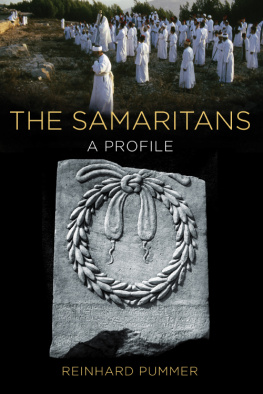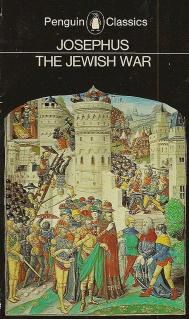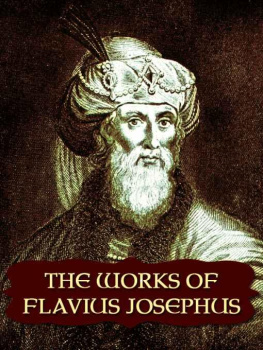THE LIFE OF APPOLLONIUS
FLAVIUS PHILOSTRATUS (c.170-c.245 CE)
Translated by F.C. Conybeare
The text of Philostratus Life of Apollonius was published (with a translation) in two volumes in the Loeb Classical Library in 1912 and has been reprinted several times.
CONTENTS
BOOK 1
SYNOPSIS OF BOOK 1
After three introductory chapters of Book 1, chapters 4-17 deal first with the birth of Apollonius and the miraculous portents that accompanied it; they go on to outline his education, his adoption of Pythagoreanism, the five years he spent in silence in Pamphylia and Lycia, and his stay in Antioch.
Chapters 18ff are devoted to Apollonius journey to Mesopotamia and Iran. In Nineveh he meets Damis,who will remain his loyal disciple and companion virtually to the end of Apollonius earthly existence (1.19).
In Cissia the travelers encounter a Greek community descended from the Eretrians deported by Darius, who are living in miserable circumstances (1.23f).
Chapters 25ff describe their stay in the court of the Parthian king Vardanes in Babylon and Ecbatana. The length of their stay with their king, in accordance with Apollonius interpretation of an omen (1.22), is one year and eight months. During this period Apollonius has regular contact with the Magi (1.26 and 39) and gains considerable influence over the king. He manages to secure an improvement in the situation of the descendants of the Eretrians (1.35) and argues for a peaceful policy toward Rome (1.37). The book ends with their departure from king Vardanes (1.40).
[1] The votaries of Pythagoras of Samos have this story to tell of him, that he was not an Ionian at all, but that, once on a time in Troy, he had been Euphorbus, and that he had come to life after death, but had died as the songs of Homer relate. And they say that he declined to wear apparel made from dead animal products and, to guard his purity, abstained from all flesh diet, and from the offering of animals in sacrifice. For that he would not stain the altars with blood; nay, rather the honey-cake and frankincense and the hymn of praise, these they say were the offerings made to the Gods by this man, who realized that they welcome such tribute more than they do the hecatombs [1] and the knife laid upon the sacrificial basket.
Note 1: A hecatomb is a sacrifice of a hundred oxen. Philostratus remark is a bit odd, because the hecatomb Pythagoras had sacrificed to express his gratitude for discovering the Pythagorean proposition, was proverbial.
For they say that he had of a certainty social intercourse with the gods, and learnt from them the conditions under which they take pleasure in men or are disgusted, and on this intercourse he based his account of nature. For he said that, whereas other men only make conjectures about divinity and make guesses that contradict one another concerning it, -in his own case he said that Apollo had come to him acknowledging that he was the god in person; and that Athena and the Muses and other gods, whose forms and names men did not yet know, had also consorted with him though without making such acknowledgment.
And the followers of Pythagoras accepted as law any decisions communicated by him, and honored him as an emissary from Zeus, but imposed, out of respect for their divine character, a ritual silence on themselves. For many were the divine and ineffable secrets which they had heard, but which it was difficult for any to keep who had not previously learnt that silence also is a mode of speech.
Moreover they declare that Empedocles of Acragas had trodden this way of wisdom when he wrote the line
Rejoice ye, for I am unto you an immortal God, and no more mortal.
And this also:
For erewhile, I already became both girl and boy.
And the story that he made at Olympia a bull of pastry and sacrificed it to the god also shows that he approved of the sentiments of Pythagoras. And there is much else that they tell of those sages who observe the rule of Pythagoras; but I must not now enter upon such points, but hurry on to the work which I have set myself to complete.
[2] For quite akin to theirs was the ideal which Apollonius pursued, and more divinely than Pythagoras he wooed wisdom and soared above tyrants; and he lived in times not long gone by nor quite of our own day, yet men know him not because of the true wisdom, which he practiced as sage and sanely; but one man singles out one feature for praise in him and another another; while some, because he had interviews with the wizards of Babylon and with the Brahmans of India, and with the nude ascetics of Egypt, put him down as a wizard, and spread the calumny that he was a sage of an illegitimate kind, judging of him ill. For Empedocles and Pythagoras himself and Democritus consorted with wizards and uttered many supernatural truths, yet never stooped to the black art; and Plato went to Egypt and mingled with his own discourses much of what he heard from the prophets and priests there; and though, like a painter, he laid his own colors on to their rough sketches, yet he never passed for a wizard, although envied above all mankind for his wisdom.
For the circumstance that Apollonius foresaw and foreknew so many things does not in the least justify us in imputing to him this kind of [black] wisdom; we might as well accuse Socrates of the same, because, thanks to his familiar spirit, he knew things beforehand, and we might also accuse Anaxagoras because of the many things which he foretold. And indeed who does not know the story of how Anaxagoras at Olympia in a season when least rain falls [2] came forward wearing a fleece into the stadium, by way of predicting rain, and of how he foretold the fall of the houseand truly, for it did fall; and of how he said that day would be turned into night, and stones would be discharged from heaven round Aegospotami, and of how his predictions were fulfilled? Now these feats are set down to the wisdom of Anaxagoras by the same people who would rob Apollonius of the credit of having predicted things by dint of wisdom, and say that he achieved these results by art of wizardry.
Note 2: The summer. He was in Olympia on the occasion of the Olympic Games.
It seems to me then that I ought not to condone or acquiesce in the general ignorance, but write a true account of the man, detailing the exact times at which he said or did this or that, as also the habits and temper of wisdom by means of which he succeeded in being considered a supernatural and divine being.
And I have gathered my information partly from the many cities where he was loved, and partly from the temples whose long-neglected and decayed rites he restored, and partly from the accounts left of him by others and partly from his own letters. For he addressed these to kings, sophists, philosophers, to men of Elis, of Delphi, to Indians, and Ethiopians; and in his letters he dealt with the subjects of the gods, of customs, of moral principles, of laws, and in all these departments he corrected the errors into which men had fallen. But the more precise details which I have collected are as follows.
[3] There was a man, Damis, by no means stupid, who formerly dwelt in the ancient city of Nineveh. He resorted to Apollonius in order to study wisdom, and having shared, by his own account, his wanderings abroad, wrote an account of them.[3] And he records his opinions and discourses and all his prophecies. And a certain kinsmen of Damis drew the attention of the empress Julia [Domna, wife of Septimius Severus] to the documents containing these documents hitherto unknown.
Note 3: Several modern scholars have argued that Damis is a literary fiction, and it is true that the neo-Pythagoreans were quite capable of fabricating old texts. On the other hand, Philostratus feels clearly uncomfortable with the information that he found in Damis, which was incompatible with his own beliefs. We probably do best to assume that this text did indeed exist, which doeshowevernot mean that itwas a reliable account of the sages travels
Next page
